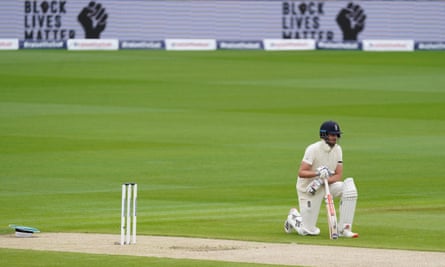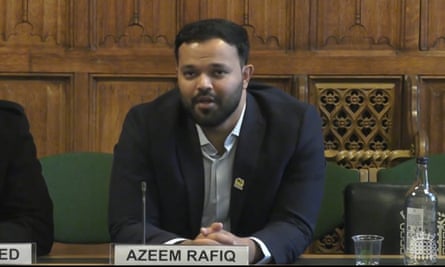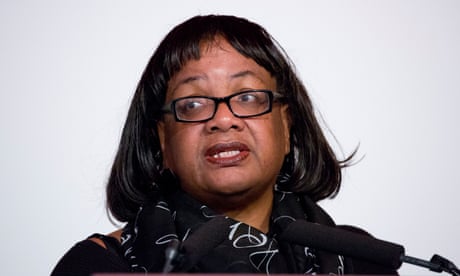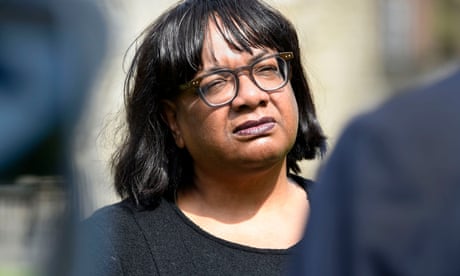You may want to sit down for this part. Turns out – no, seriously – that a sport created and codified for the purpose of allowing rich white landowners to bet against each other, and then exported around the world at gunpoint with the promise that it would civilise savage peoples, may not actually be that progressive.
How can this possibly have happened? Who do we see about this? And who’s asking, anyway?
The publication of the Independent Commission for Equity in Cricket’s report into systemic discrimination in the English game will doubtless be described as many things. A wake‑up call. A line in the sand. A humiliation. What it represents to those who have been arguing the point for many years is, rather, a kind of historical artefact: documentary proof that English cricket’s in-built prejudice against women, people of colour and people from poorer backgrounds is not some fey liberal invention or a jaundiced troublemaker’s charter, but a lived reality for many people for many years, perhaps even generations.
It is above all a devastatingly frank document, both in its analysis of the problem and its proposed solutions. The England and Wales Cricket Board’s first‑look response, a wide-ranging apology for the injustices that have occurred on its watch, may feel instinctively like so much corporate whitewash. But even a few years ago the very idea that the national governing body would admit its complicity in a racist, sexist system would have felt fanciful. In this case, diagnosis really can be the first step of the treatment.
And here the ICEC helpfully provides the hard data to back up decades of hunches and anecdotes. A staggering 87% of respondents of Pakistani and Bangladeshi heritage, 82% with Indian heritage and 75% of all black respondents reported encountering discrimination in the game. The real kicker, though, is the deficit of trust that the vast majority felt with a game that was supposed to protect them: a feeling that cricket’s authorities, the white male captains and coaches and chief executives and board chairs who hold all the power in the game, would instinctively lean towards the status quo.
South Asians make up 28% of the game’s recreational pool, but just 2.8% of the sport’s executive-level positions. Black participation was measured by a Sport England survey to be so low as to be statistically irrelevant. The percentage of England male cricketers who were privately educated was 58% in 2021, compared to 7% in the population at large. For years anybody pointing this out has met a wall of complacency and silence, a modern version of the classic Henry Newbolt poem: “Play up! Play up! And play the game!” This is, after all, England. We don’t talk about these things.

The debate sparked by Black Lives Matter has been steered away from meaningful change. Photograph: Reuters
The first thing to note is that there are certain people – many people – for whom all this is evidence that the world is simply working as it should. Your one black friend makes you an ally. Your one female cricket writer makes your publication diverse. Your one British Asian prime minister makes your country progressive. And your one working-class men’s Test captain makes your team representative. For these people there has long been a kind of selective blindness at work here: an image of English cricket as a kind of idyllic safe space, a world of village greens and good chaps, one of whom is called Khan, actually, so stick that in your pipe and smoke it.
It is a malaise almost as old as England itself, and perhaps the most devastating parts of the report are those that deal with cricket’s historical baggage, the legacy of Victorian Britain and the slave trade, the inequities that were built into the game from its very foundation.
Nobody gets to draw a line under this. Nobody gets to move on until everybody gets to move on
“Cricket needs to engage more frankly with the fact that [its] history is replete with tensions and social conflicts, even histories of brutality and oppression,” the report states. For some this will be nothing more than a statement of the obvious. But it is also perhaps the first time anybody remotely near a position of power has dared to utter it.
And of course you do not need to go back centuries to glimpse how cricket’s original sin continues to inflect it into the present day. It was in 1995 that the Independent lauded the fact that England’s (all‑white) pace attack “did not for once look like a United Nations strike force”. The same year, Surrey’s chief executive Glyn Woodman trumpeted the measures he had taken to deter British West Indies fans from attending the Oval Test.
“Twenty years ago parts of the ground were almost no-go areas,” he said. “They could sit wherever they liked, and they can’t do that now because of pre-selling of tickets.” And lest you regard even this as ancient history, then consider that one of the most bitter debates in the game at the moment is whether Eton and Harrow should be the only two schools who get to play at Lord’s.
The first thing to note is that there are certain people – many people – for whom all this is evidence that the world is simply working as it should. Your one black friend makes you an ally. Your one female cricket writer makes your publication diverse. Your one British Asian prime minister makes your country progressive. And your one working-class men’s Test captain makes your team representative. For these people there has long been a kind of selective blindness at work here: an image of English cricket as a kind of idyllic safe space, a world of village greens and good chaps, one of whom is called Khan, actually, so stick that in your pipe and smoke it.
It is a malaise almost as old as England itself, and perhaps the most devastating parts of the report are those that deal with cricket’s historical baggage, the legacy of Victorian Britain and the slave trade, the inequities that were built into the game from its very foundation.
Nobody gets to draw a line under this. Nobody gets to move on until everybody gets to move on
“Cricket needs to engage more frankly with the fact that [its] history is replete with tensions and social conflicts, even histories of brutality and oppression,” the report states. For some this will be nothing more than a statement of the obvious. But it is also perhaps the first time anybody remotely near a position of power has dared to utter it.
And of course you do not need to go back centuries to glimpse how cricket’s original sin continues to inflect it into the present day. It was in 1995 that the Independent lauded the fact that England’s (all‑white) pace attack “did not for once look like a United Nations strike force”. The same year, Surrey’s chief executive Glyn Woodman trumpeted the measures he had taken to deter British West Indies fans from attending the Oval Test.
“Twenty years ago parts of the ground were almost no-go areas,” he said. “They could sit wherever they liked, and they can’t do that now because of pre-selling of tickets.” And lest you regard even this as ancient history, then consider that one of the most bitter debates in the game at the moment is whether Eton and Harrow should be the only two schools who get to play at Lord’s.

West Indies fans celebrate during the fifth Test between England and the West Indies at the Oval in August 1976. Photograph: Fresco/Evening Standard/Hulton Archive/Getty Images
Similarly, the debate catalysed in 2020 by Black Lives Matter and Azeem Rafiq has been maliciously steered away from a conversation about meaningful change towards the more headline-friendly territory of witch hunts, who said what to whom, and who is a racist, whatever that means. One of the report’s more understandable blind spots is the role of the media and political class in actively seeking to derail the cause of diversity in an attempt to validate and provoke the prejudices of its older white male constituency (or “Type K individuals”, as the report so deliciously categorises them). But you get a flavour in the commission’s decision to anonymise all evidence to ward against “the impact of media reporting on those discussing discrimination in cricket, [which] was often alarming and profound”. The merciless hounding of Rafiq by the right-wing press springs to mind here.
Doubtless many of the same people will now call for a line to be drawn under English cricket’s reign of shame. Sorry. Nobody gets to draw a line under this. Nobody gets to move on until everybody gets to move on. Nobody gets to plead “stick to cricket”. This stuff is cricket. Are international ticket prices too high? Should we call them “batters” or “batsmen”? Is your county’s membership really representative of the area at large? How do we prevent age-group selections from being defined by whose parents can afford a set of pads and gloves? When your fast bowler with a history of racist tweets verbally abuses a Muslim opponent in an Ashes Test, do you start asking questions, or do you simply assume you already know the answers?
Similarly, the debate catalysed in 2020 by Black Lives Matter and Azeem Rafiq has been maliciously steered away from a conversation about meaningful change towards the more headline-friendly territory of witch hunts, who said what to whom, and who is a racist, whatever that means. One of the report’s more understandable blind spots is the role of the media and political class in actively seeking to derail the cause of diversity in an attempt to validate and provoke the prejudices of its older white male constituency (or “Type K individuals”, as the report so deliciously categorises them). But you get a flavour in the commission’s decision to anonymise all evidence to ward against “the impact of media reporting on those discussing discrimination in cricket, [which] was often alarming and profound”. The merciless hounding of Rafiq by the right-wing press springs to mind here.
Doubtless many of the same people will now call for a line to be drawn under English cricket’s reign of shame. Sorry. Nobody gets to draw a line under this. Nobody gets to move on until everybody gets to move on. Nobody gets to plead “stick to cricket”. This stuff is cricket. Are international ticket prices too high? Should we call them “batters” or “batsmen”? Is your county’s membership really representative of the area at large? How do we prevent age-group selections from being defined by whose parents can afford a set of pads and gloves? When your fast bowler with a history of racist tweets verbally abuses a Muslim opponent in an Ashes Test, do you start asking questions, or do you simply assume you already know the answers?

The hounding of Azeem Rafiq by the right-wing press is one of the report’s blind spots. Photograph: House of Commons/PA
And of course the backlash to this report will be severe and merciless. Those who wish to remain blind will do everything to avoid seeing. But the time for squeamishness has long passed. From its very earliest days English cricket was conceived as a Type K pastime: a game run by well‑off white men, for the benefit of well-off white men, defined and written about by well-off white men. Unsurprisingly, those well-off white men quite like things the way they are. But in many ways, English cricket brought this fight on itself. The very least it can do by way of recompense is to win it.
And of course the backlash to this report will be severe and merciless. Those who wish to remain blind will do everything to avoid seeing. But the time for squeamishness has long passed. From its very earliest days English cricket was conceived as a Type K pastime: a game run by well‑off white men, for the benefit of well-off white men, defined and written about by well-off white men. Unsurprisingly, those well-off white men quite like things the way they are. But in many ways, English cricket brought this fight on itself. The very least it can do by way of recompense is to win it.


